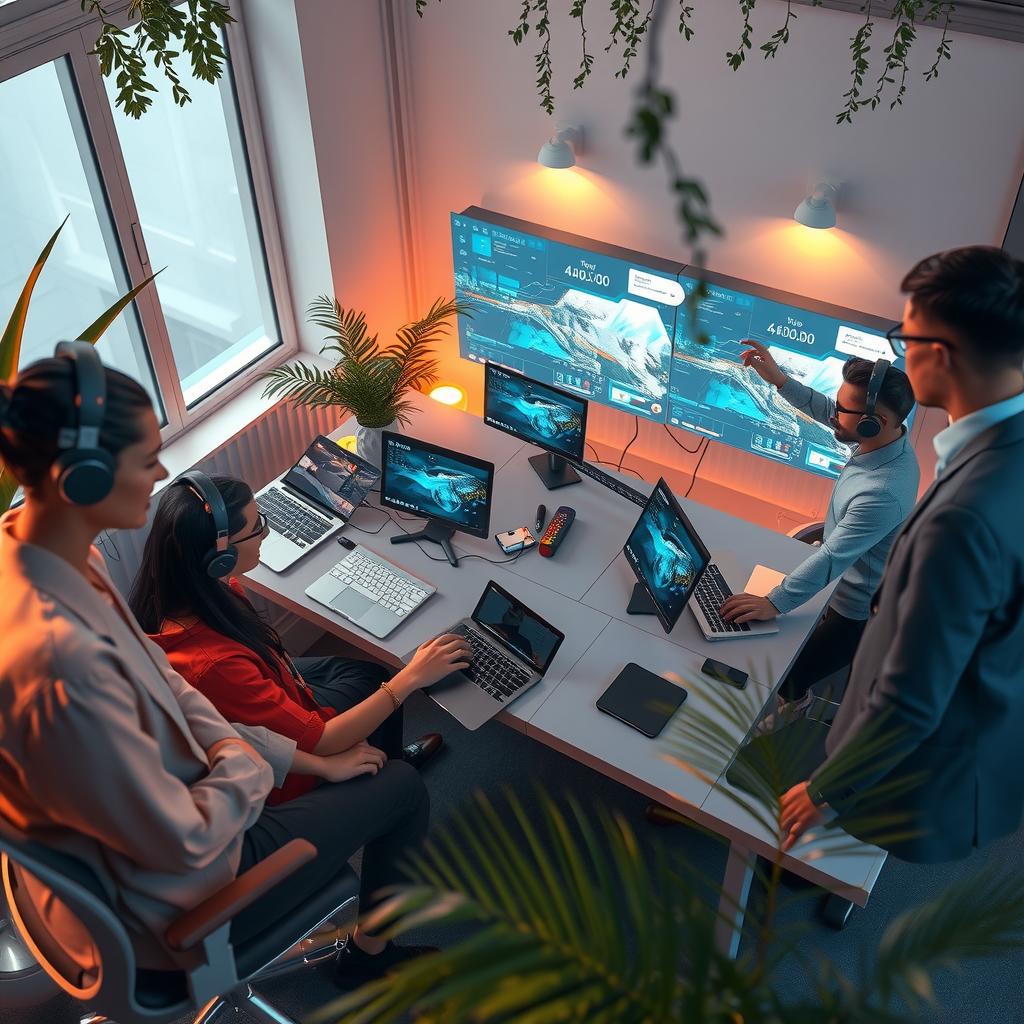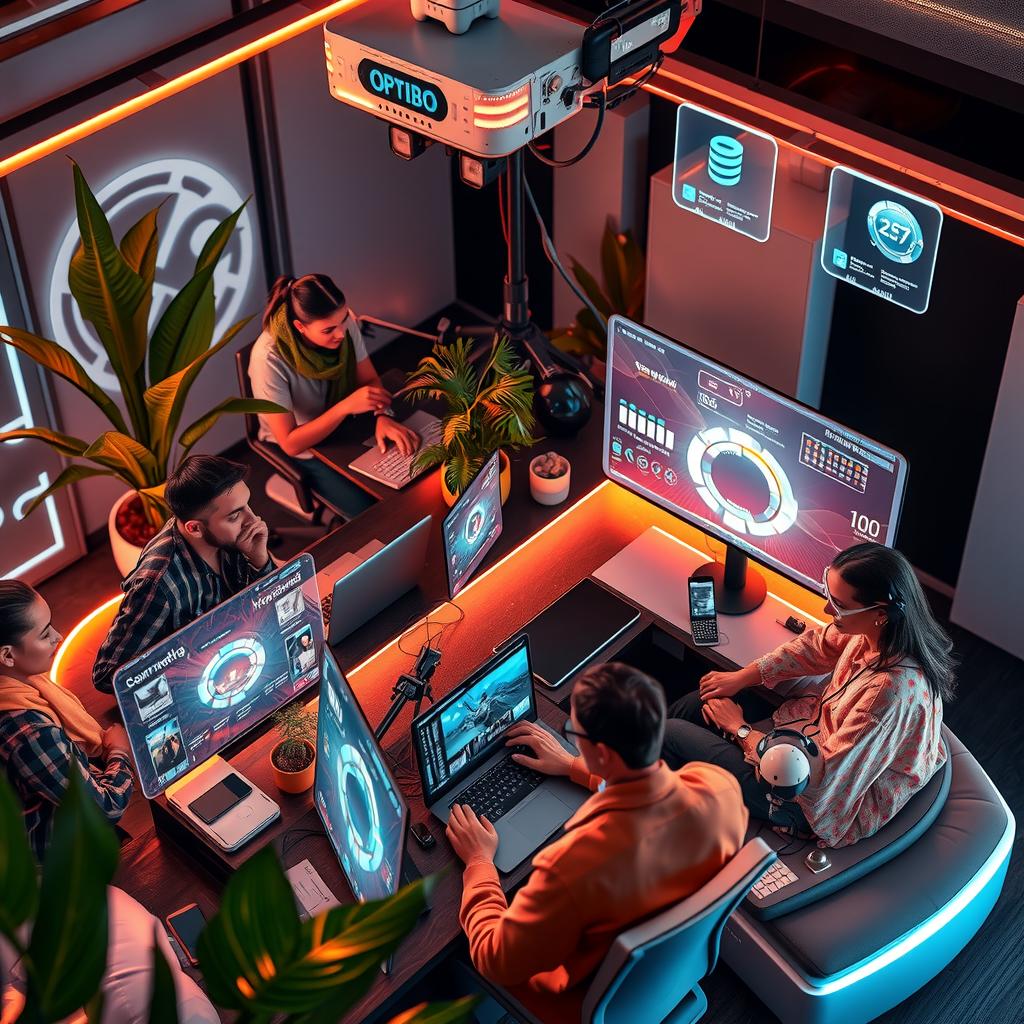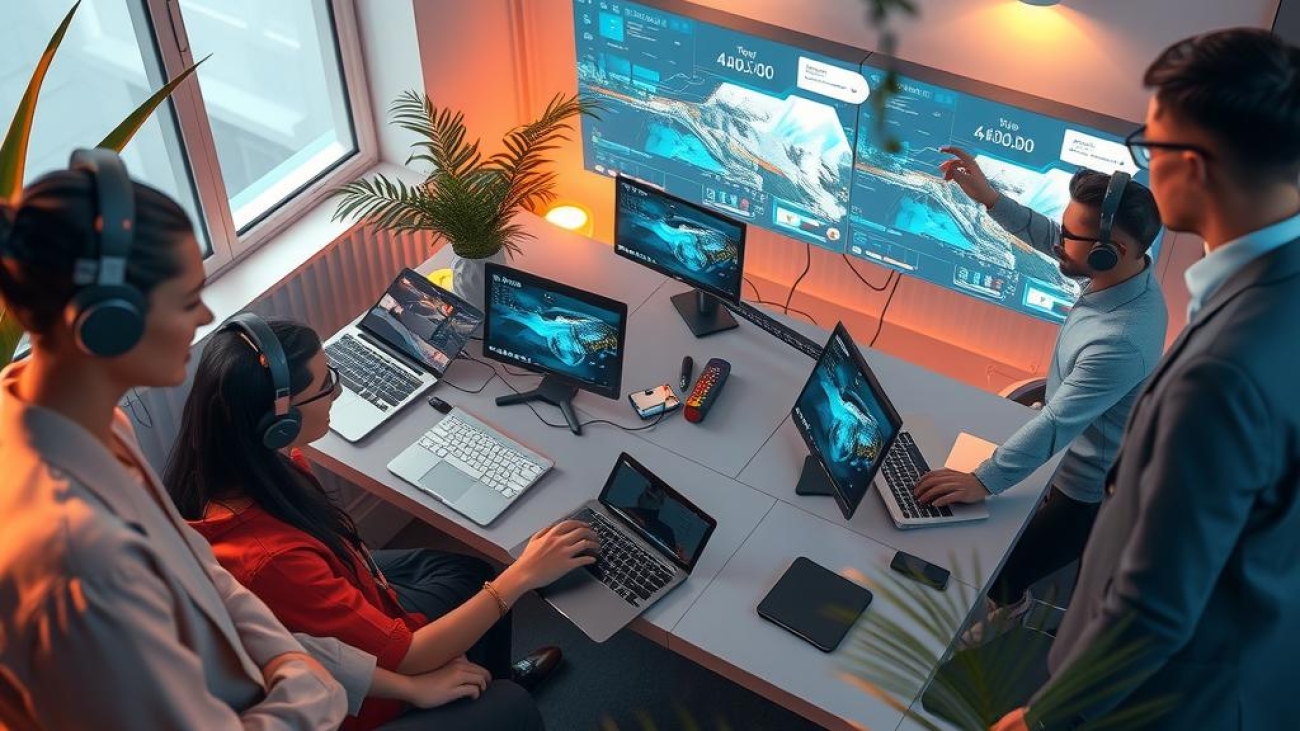As the world adapts to a new era of working, understanding the dynamics shaping the future landscape becomes crucial for businesses and employees alike. The blog post titled The Future of Remote Work delves into various trends and predictions poised to redefine professional environments between 2025 and 2030. With advances in workplace technology, organizations are embracing innovative solutions that enhance productivity while prioritizing employee well-being. Asynchronous work models are gaining traction, allowing teams across different time zones to collaborate effectively without the constraints of traditional office hours. This shift highlights a significant change in how remote teams operate, emphasizing flexibility as a core value in modern workplaces.
In addition to flexible work arrangements, developments such as virtual reality offices and brain-computer interfaces promise immersive experiences that bridge physical distances, fostering collaboration like never before. These technologies will not only enhance communication but also reshape workplace culture by making virtual interactions more engaging. Coupled with advancements in AI workflow management, organizations can expect streamlined processes that minimize downtime and maximize efficiency, ensuring seamless project execution across decentralized teams.
Furthermore, the rise of decentralized organizations (DAOs) is revolutionizing governance structures within companies, empowering individuals with greater autonomy while aligning them towards common goals. This evolution presents unique challenges but also opportunities for international hiring trends, enabling access to diverse talent pools regardless of geographical limitations. However, this global reach necessitates careful consideration of remote work policies and regulations aimed at standardizing practices across borders.
As discussions around work-life balance continue to evolve, predictions surrounding initiatives like a four-day work week gain momentum among thought leaders who advocate for improved mental health outcomes through reduced workloads. Such shifts could influence educational systems’ evolution by equipping future generations with essential skills for remote work—an area increasingly prioritized by both academic institutions and corporations.
Moreover, these transformative changes will undoubtedly impact real estate markets; urban planning must adapt accordingly as people migrate away from city centers seeking affordable housing options that accommodate hybrid lifestyles or fully remote positions. Salary normalization globally will further play a role in shaping compensation strategies as employers strive to attract top talent while maintaining equity across diverse locations.
By examining these interlinked trends within the framework provided by The Future of Remote Work, readers can gain valuable insights into what lies ahead—a landscape where adaptability thrives amidst technological innovations reshaping how society views employment altogether.

Key Insights:
- Technological Innovations: The evolution of remote work is significantly driven by advancements in workplace technology. Emerging tools such as virtual reality offices, AI workflow management, and even brain-computer interfaces are reshaping how employees interact and perform tasks. These innovations will be pivotal in enhancing productivity and collaboration, marking a substantial shift towards the future of remote work.
- Decentralized Organizational Structures: The rise of fully decentralized companies, including DAOs (Decentralized Autonomous Organizations), is altering traditional business models. As organizations embrace these structures, they enable greater flexibility and autonomy for employees across the globe. This shift aligns with ongoing remote work trends that prioritize employee empowerment within diverse international teams.
- Work-Life Integration Trends: Future predictions surrounding a potential transition to a four-day work week highlight the evolving dynamics of employee well-being and productivity. Additionally, asynchronous work models paired with effective global time zone management are becoming essential components in shaping modern working environments. These changes reflect an adaptation to new demands on skills for remote work while also influencing educational systems evolution to prepare future generations for this landscape.

The Transformation of Workspace Dynamics
Redefining Collaboration in the Digital Era
The landscape of remote work has evolved dramatically, driven by technological advancements that redefine how teams collaborate. With virtual reality offices becoming increasingly prevalent, organizations now have the opportunity to immerse employees in environments that mimic physical office settings while offering unique interactive capabilities. This shift is not only about creating a sense of presence but also about enhancing productivity through innovative designs and layouts tailored for collaboration. Additionally, as AI workflow management tools become more sophisticated, they streamline processes and improve efficiency by automating repetitive tasks, allowing team members to focus on higher-value activities. These developments signify a major leap toward an integrated future where technology facilitates seamless interaction across global teams. In this context, The Future of Remote Work becomes pivotal in ensuring organizations leverage these innovations effectively to foster engagement and creativity among remote workers.
Harnessing AI for Enhanced Productivity
The Role of Intelligent Systems in Modern Workspaces
As businesses navigate the complexities associated with distributed teams, the integration of artificial intelligence into everyday operations stands at the forefront of workplace technology trends. AI-driven platforms are optimizing communication channels and providing actionable insights derived from data analytics—empowering managers with resources that enhance decision-making processes. Furthermore, these systems can facilitate asynchronous work models that accommodate diverse schedules across different time zones; thus enabling a smoother flow of information without overwhelming employees with real-time demands. As highlighted within discussions on The Future of Remote Work, companies adopting these intelligent frameworks are positioning themselves advantageously amidst evolving workforce dynamics characterized by international hiring trends and salary normalization globally. By embracing such technologies and methodologies—including brain-computer interfaces—the potential for enhanced employee satisfaction increases significantly while redefining traditional working hours.
Navigating New Organizational Structures
Decentralized Organizations Shaping Tomorrow’s Workforce
In an era marked by rapid shifts towards decentralization exemplified through concepts like DAOs (Decentralized Autonomous Organizations), businesses are reimagining their operational frameworks to align with modern expectations surrounding flexibility and inclusion within remote work policies and regulations. This transformation emphasizes empowerment rather than hierarchy; it encourages individuals to contribute uniquely based on their skill sets irrespective of geographic boundaries—a hallmark feature touted in discussions around The Future of Remote Work. Such structures not only promote innovation but also adapt seamlessly to changes like four-day work week predictions aimed at fostering better work-life balance among employees worldwide while addressing urban planning changes influenced by decreased demand for conventional office spaces post-pandemic. Ultimately, as organizations embrace this new paradigm informed heavily by technological evolution—from virtual reality offices facilitating immersive experiences to comprehensive training programs centered around skills for remote work—the benefits extend far beyond productivity metrics alone; they encompass holistic growth trajectories aligned closely with societal needs moving forward.

Decentralized Organizations: A New Paradigm for Remote Work
Exploring the Role of DAOs in Modern Work Environments
The emergence of decentralized organizations and DAOs (Decentralized Autonomous Organizations) represents a significant shift in how companies operate, especially within the context of remote work trends. These frameworks provide innovative solutions to some of the challenges posed by traditional organizational structures. In an age where telecommuting has become increasingly common, fueled by advancements in workplace technology, decentralized structures enable teams to function without centralized control, promoting autonomy and flexibility. This is particularly essential when considering global time zone management; team members can contribute from various parts of the world at their convenience. Furthermore, as professionals seek more fulfilling careers amidst predictions about a four-day work week, decentralized organizations align well with new expectations regarding personal time and productivity. The integration of advanced technologies such as AI workflow management enhances operational efficiency while minimizing bureaucratic hurdles that often stifle creativity and agility within conventional enterprises. As remote teams flourish under these models, they redefine not just individual roles but also how leadership is conceived—shifting power dynamics towards collective decision-making processes.
Reimagining Workplace Culture
The Impact on Employee Engagement and Collaboration
With the rise of decentralized organizations, fostering a robust workplace culture becomes paramount to ensure employee engagement remains high in this distributed environment. Unlike traditional firms that rely heavily on physical presence for collaboration, modern workplaces are exploring virtual reality offices that simulate real-world interactions among team members spread across different regions. Such immersive experiences not only enhance communication but also help build camaraderie among colleagues who may have never met face-to-face. As part of The Future of Remote Work, cultivating an inclusive culture requires strategic investment in digital tools that support asynchronous work models, allowing employees to connect meaningfully regardless of their working hours or locations. Additionally, educational systems must evolve alongside these changes by equipping individuals with skills for remote work through tailored training programs focused on digital collaboration techniques and emotional intelligence development—skills critical for thriving within decentralized frameworks.
Transforming Real Estate Markets
Implications for Urban Planning
The proliferation of decentralized structures is poised to significantly impact real estate markets globally as demand shifts away from conventional office spaces toward adaptable living environments conducive to hybrid working arrangements. With many companies adopting permanent remote policies or flexible schedules driven by insights gained during the pandemic era, urban planning must adapt accordingly—reallocating resources previously earmarked for commercial developments into residential projects designed around community interaction rather than solitary office settings. Moreover, salary normalization globally becomes increasingly important amidst international hiring trends; employees should receive equitable compensation reflective not solely on geographic location but skill sets offered irrespective thereof—a principle deeply ingrained within DAOs’ ethos emphasizing fair participation across borders despite disparities caused by varying costs-of-living indices.
Regulatory Challenges Ahead
Navigating Policies for Decentralization
As The Future of Remote Work unfolds alongside growing interest in decentralized organizations like DAOs, navigating regulatory landscapes poses unique challenges requiring proactive measures from policymakers worldwide—all striving towards effective remote work policies aimed at protecting both employers’ interests while safeguarding workers’ rights amid this rapidly evolving terrain marked by technological innovation coupled with shifting societal norms surrounding employment practices today versus those priorly entrenched historically over decades past! Developing comprehensive regulations will be crucial—not only guiding adherence amongst emerging businesses opting into these novel forms—but also ensuring sustainable growth long-term whilst maximizing benefits derived ultimately reflecting positive outcomes realized via improved efficiencies enabled through artificial intelligence-driven platforms facilitating seamless connectivity between disparate parties involved throughout diverse endeavors undertaken collectively together towards shared visions fostering greater synergies enhancing overall productivity levels achieved consistently over time!

International Hiring Trends: Shaping the Workforce of Tomorrow
The evolution of global hiring practices is increasingly influenced by technological advancements and shifting workplace paradigms. As organizations embrace remote work trends, there emerges a need for robust frameworks that facilitate effective international collaboration. The Future of Remote Work highlights how companies are adapting their recruitment strategies to attract talent from diverse geographical locations, leveraging digital platforms that allow employers to reach candidates across borders. This trend not only democratizes job opportunities but also enriches organizational culture through varied perspectives and skills. Moreover, as businesses pursue a more extensive talent pool, they face challenges regarding compliance with local labor laws and regulations in multiple jurisdictions. Organizations must develop comprehensive remote work policies that adhere to these varying legal requirements while ensuring equitable treatment across different regions.
As salary normalization becomes paramount in attracting top-tier talent globally, firms are increasingly focusing on transparent compensation structures that reflect the cost of living adjusted pay scales rather than traditional location-based salaries. This shift is essential as it promotes fairness and helps mitigate disparities among remote employees located in different countries or cities with varying economic conditions.
Navigating Remote Work Regulations: Challenges Ahead
The complexity surrounding remote work regulations cannot be understated as jurisdictions strive to keep pace with evolving employment landscapes brought on by increased telecommuting practices. The Future of Remote Work emphasizes the necessity for corporations to stay informed about regional compliance issues such as taxation, employee benefits, data protection laws, and other statutory obligations pertinent to remote workers’ locations. Given the rise of decentralized organizations like DAOs (Decentralized Autonomous Organizations), navigating this regulatory environment requires astute legal guidance and strategic planning.
Furthermore, hybrid models incorporating aspects like asynchronous work models necessitate additional considerations around global time zone management—enabling teams spread worldwide to collaborate effectively without compromising productivity or engagement levels within their respective roles.
Organizations are now called upon not only to adapt operational processes but also invest in sophisticated workplace technology solutions such as AI workflow management tools and virtual reality offices which can bridge gaps caused by distance while fostering collaboration among dispersed teams.
In addressing the impact on real estate markets driven by shifts toward flexible working arrangements—including potential predictions surrounding concepts like a four-day workweek—it becomes evident how urban planning changes could arise due to reduced demand for physical office spaces alongside altered commuting patterns resulting from an increased emphasis on remote working capabilities.
Overall, understanding these dynamics will empower enterprises seeking sustainable growth amidst changing workforce expectations while embracing innovative approaches towards education systems evolution aimed at equipping future generations with necessary skills for remote work.

FAQ:
Q:What are the key technological advancements expected to shape the future of remote work?
A:The Future of Remote Work is anticipated to be significantly influenced by various technological trends. Innovations such as virtual reality offices, AI-powered workflow management, and even brain-computer interfaces for work will redefine how tasks are completed. These advancements will not only enhance productivity but also foster a more immersive collaboration experience among remote teams.
Q:How might organizational structures evolve with the rise of remote work?
A:As organizations adapt to long-term remote work trends, there is an expected shift towards fully decentralized companies and DAOs (Decentralized Autonomous Organizations). This evolution in organizational structure allows for greater flexibility and autonomy, redefining traditional hierarchies while aligning with the principles outlined in the Future of Remote Work.
Q:What changes can we expect regarding work-life integration in future workplaces?
A:Predictions suggest that concepts like a four-day work week, asynchronous work models, and global time zone management will become standard practices. Such changes aim to improve employee well-being and efficiency within the framework of the Future of Remote Work. By accommodating diverse schedules across different regions, organizations can better leverage international talent while enhancing overall productivity.
